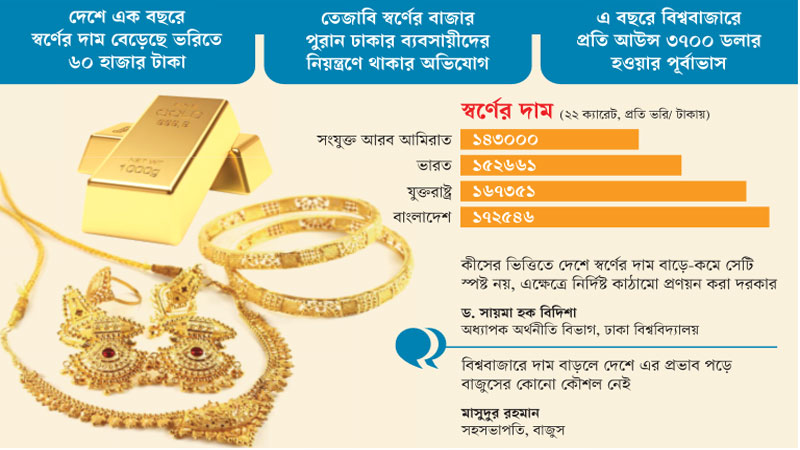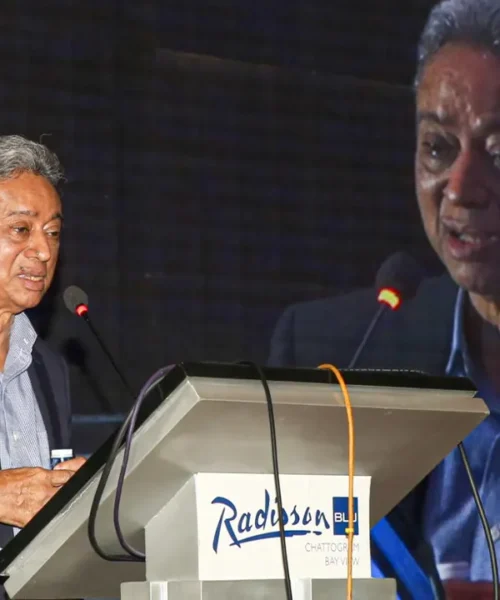The price of gold fluctuates quite frequently in the country's market. However, the amount decreases, but increases more than it does. Thus, in the past year, the price of good quality gold, i.e. 22 carats per bhori, has increased by about 60,000 taka. Traders in this sector claim that such a rise in the price of gold in the local market is mainly due to the global market. According to them, the increase in prices has led to a decline in sales. Sales have decreased by half.
In some cases, there is a difference of up to 60,000 taka per kilogram compared to the world market. As a result, the question arises, on what basis or criteria is the price of gold determined in Bangladesh? Economists also say that it is unclear how the price in the domestic market is adjusted to the world market. Although traders mainly benefit from this, buyers are being cheated. In this situation, they suggest setting up a specific price determination framework and formulating effective policies for imports.
Since the Corona pandemic, the price of gold has been increasing in the global market. The price of gold has been fluctuating for several years. In recent months, the price has been fluctuating unusually. Due to the increase in prices in the global market, the market for the precious metal is also becoming unstable in Bangladesh. As a result, why is the price increasing so much, how long can it continue to increase, and where will the price ultimately end - such questions are swirling in the minds of gold lovers. Again, those who are thinking about investing are also in doubt. In this global situation, questions have arisen about whether now is a good time to invest, or whether the price will suddenly fall again. However, concerns are growing about the abnormal increase in prices in the country.
How much have prices increased in the country in a year?
On April 27 last year, the price of 22-carat gold per bhori was around 1 lakh 13 thousand taka. The price has fluctuated several times in the past year. However, every time the price has decreased, that is, the amount has increased more than the amount it has decreased. It has been seen that after increasing by 5 thousand taka in two phases, it has decreased by 1 or 1.5 thousand taka. Thus, the price has increased in the past year and has now reached 1 lakh 72 thousand taka. Accordingly, the price has increased by about 60 thousand taka per bhori in a year.
Gold prices in the country are higher than in the global market.
The price of good quality gold in the country reached a historic high on April 22. The Bangladesh Jewelers Association (BAJUS) announced the price of a 22-carat gold bhori (11.664 grams) at 1 lakh 77 thousand taka that afternoon. However, the price dropped again to 1 lakh 72 thousand 546 taka that evening. So far, gold bhori is being sold at this price.
A review of international market prices has shown that the price of gold set by the government is not only the highest in the country's history, but also exceeds the current international price. The price of gold is even higher than that of neighboring India.
In the New York spot market in the United States, 22-carat gold was last traded at a minimum of $3,334 per ounce (28.3495 grams). At a dollar exchange rate of 122 taka, gold was traded at a price of 167,351 taka per baht. This means that gold is being traded at a price of at least 5,000 taka higher per baht in the country.
According to the news of the online portal of the Indian media Angel One Bangla, according to the market price fixed by the country's Jewelers' Association, 22-carat gold was bought and sold for 9,089 rupees per gram yesterday. With the exchange rate of 1 taka 43 paisa to the rupee, the price per bahri in India is 1 lakh 52 thousand 661 taka. Accordingly, gold is being sold at a price of about 20 thousand taka more per bahri in Bangladesh than in India.
According to the United Arab Emirates' Khaleej Times, the current price of 22-carat gold per gram in Dubai is 367.75 dirhams. With an exchange rate of 33.34 taka per dirham, the price of gold per baht stands at 1 lakh 43 thousand taka. That is, the price of gold per baht in the World Trade Center Dubai is about 29 thousand taka lower than in Bangladesh. Analysis shows that the price of gold in all three countries is much lower than in Bangladesh. As a result, the question arises, on what basis is the price of gold being determined in Bangladesh?
A source in the traders said that the gold traders in Tanti Bazar in Old Dhaka basically control the market for acid gold. They buy new and old gold. The control is basically in their hands. A top gold trader, on condition of anonymity, told Samakal that the gold market in Bangladesh is currently fluctuating with India. Traders in Kolkata usually fix the price of gold around noon. After that, traders in Old Dhaka fix the local price. This price is for jewelry traders, not for retail buyers. Bajus announces the price of gold based on that price.
Bajus Vice President Masudur Rahman told Samakal that if the price increases in the world market, it has an impact on the country. Basically, when the price of acidic gold increases, Bajus increases the price. Bajus has no strategy here. Rather, sales have decreased by half in the last few years due to the increase in price. However, he also said that there are various problems in gold import, including LC complications and tax rates.
Why are prices rising in the world market?
According to economists and jewelers, global geopolitical tensions, the ongoing trade war between the United States and China, the imposition of additional US tariffs on exports from various countries, and the decline in the value of the dollar have created a kind of uncertainty in the global economy. Central banks around the world usually keep dollars in reserve. The dollar price is now at its lowest in the last three years. Fearing that the price may fall further due to this global instability, central banks are increasing their reserves of gold instead of dollars. This is acting as a catalyst behind the price increase. Especially due to the increase in US tariffs on China, China's central bank has been continuously buying gold instead of dollars.
Further growth forecast in the global market
US investment bank Goldman Sachs recently raised its forecast for a recession in the US economy to 35 percent, up from 20 percent previously. The company says the US central bank, the Federal Reserve (Fed), may cut interest rates, which will further increase demand for gold.
Based on this idea, the company has revised its previous forecast for the price of gold. The company had previously predicted that the price of gold would rise to $3,300 per ounce. In its new analysis, they say that the price of an ounce could fluctuate between $3,650 and $3,950. It could average $3,700 by the end of the year.
Dhaka University's Deputy Vice Chancellor (Administration) and economist Professor Dr. Saima Haque Bidisha believes that a rule or framework needs to be formulated to increase the price of gold in the country. She told Samakal that the common people do not understand exactly how gold is sold or priced in the country. Prices are being increased in the country irregularly for a few days in a row. Although the price is increased by talking about the world market, there is a huge difference in price with the world market. So, on what basis does the price of gold actually increase or decrease in the country?
This economist believes that buyers are in trouble when prices suddenly increase. Citing an example, he said, someone might be planning to buy a piece of jewelry next week. After a week, when he went to buy it, he found that the price of the piece had increased by four to five thousand taka. Then he saw that his plan to buy jewelry had been ruined. This happens regularly. Therefore, it is very important to examine the logic or criteria by which the price of gold in the country is being determined, and how consistent the country's price is with the global price.
Dr. Saima Haque Bidisha said, now gold may be coming from abroad through baggage rules or in various ways. There needs to be specific policies for legal import, then imports through legal channels will increase. Then everyone will be aware of the price. At the same time, it will reduce gold smuggling through illegal channels. Apart from that, she believes there should be updated information about the amount of demand in the country and the amount being imported.
Stating that Bangladesh's prices are out of sync with the world market, this economist said, investors are turning to gold for various reasons including global instability and recession in the capital market. This does increase the price of gold, but it is necessary to consider how logical it is to increase the price in Bangladesh. It remains to be seen how much the price has been in sync with the world market prices.




